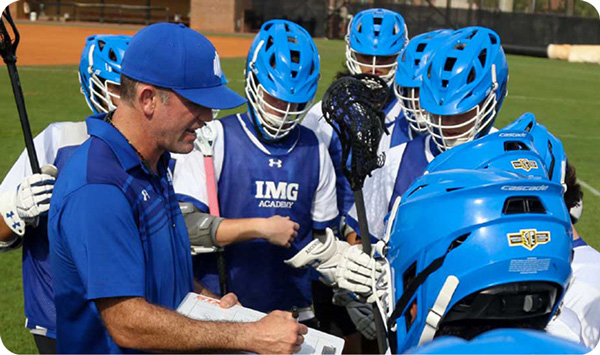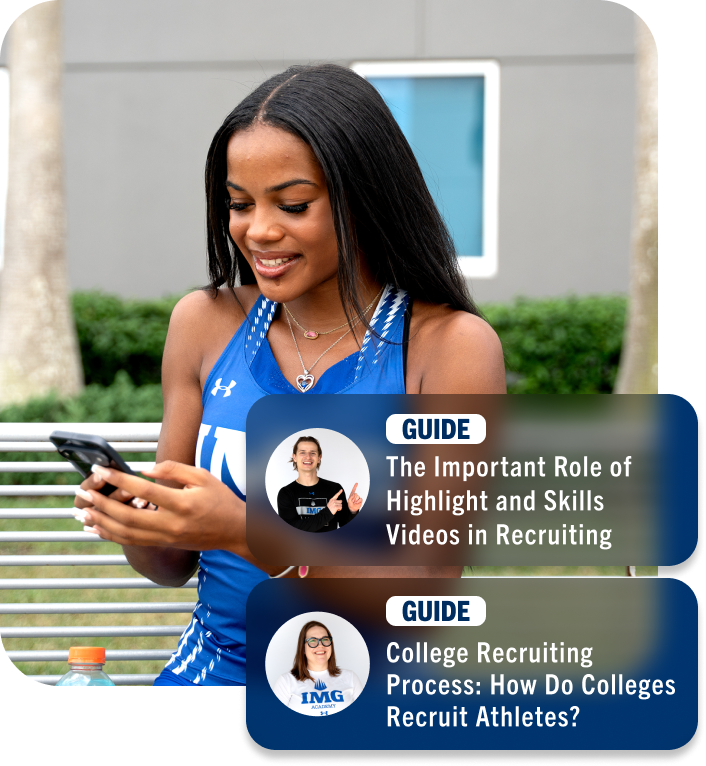How to Get Recruited
Our guides on “How to Get Recruited” are your ultimate playbook for navigating the college athletic recruiting process. Packed with expert advice, they break down key steps like starting early, understanding what coaches look for, and making yourself stand out. These guides will equip you with the tools to turn your athletic dreams into reality.
How to Get Recruited
How the College Recruiting Process Works
Learn how college coaches recruit athletes—from identifying prospective athletes to extending offers and signing them.
How to Get Recruited
Understand the College Divisions
Explore the unique features, benefits, and challenges of the NCAA, NAIA, and JUCO athletic divisions to find the college level that’s the perfect fit for you.
How to Get Recruited
A Guide to Athletic Scholarships
Discover the strategies every family needs to unlock athletic scholarships and navigate NCAA requirements with confidence.
How to Get Recruited
Create a College Recruiting Video
A great highlight video can get you some serious attention from college coaches. This guide covers what footage to capture and showcase on your recruiting profile.
How to Get Recruited
Attend Workshops to Expand Your Recruiting Knowledge
Enhance your recruiting knowledge and sharpen your skills with our expert-led online workshops hosted by former college coaches.
DON’T HAVE AN NCSA PROFILE YET?
Join over 4 million athletes who have used NCSA to connect with college coaches, get expert recruiting guidance, and find their perfect college match!
Explore Colleges and Find Your Best Fit
Finding a college that fits your needs is an important step in your recruiting journey and can make a big difference in your future success. That’s why it’s a good idea to research different programs and make a well-rounded school list to give yourself the best chance to find the right college for you.
Explore Colleges
The Best Colleges for Student-Athletes
We ranked the most sought-after schools among millions of high school student-athletes and their families using the NCSA platform.
Explore Colleges
NCAA Division 1 Colleges
View a complete list of NCAA Division 1 Colleges.
Explore Colleges
NCAA Division 2 Colleges
View a complete list of NCAA Division 2 Colleges.
Explore Colleges
NCAA Division 3 Colleges
View a complete list of NCAA Division 3 Colleges.
Coach Communication
Our coach communication guides focus on building effective communication with college coaches and making meaningful connections that showcase your skills and dedication. Learn how to craft impactful emails, prepare for phone calls, and ask the right questions to stand out during the recruiting process.
Coach Communication
A Guide to Emailing Coaches
Learn how to craft effective emails to college coaches, including tips on subject lines, personalizing messages, and showcasing achievements, to make a strong first impression.
Coach Communication
Resources for Calling Coaches
Learn how to confidently communicate with college coaches on the phone with preparation tips, voicemail templates, and follow-up strategies to boost your recruiting potential.
Coach Communication
How to Use Social Media for Recruiting
This guide provides strategies for using social media in college recruiting, including tips for engaging with coaches on various platforms, and best practices for a professional online presence.
Guide to camps and recruiting events
Discover the purpose of camps, combines, and showcases, and learn how to choose events that align with your skills and recruiting goals.

Follow Eligibility and Recruiting Rules
Navigating eligibility requirements is a key step in the recruiting process. The NCAA and NAIA each have specific rules and standards. Our resources simplify these guidelines, helping you understand what’s needed to compete at the collegiate level.
NCAA Eligibility & Recruiting Rules
A Guide to NCAA Eligibility Center
Learn how the NCAA Eligibility Center works and what steps to take to ensure compliance with academic and amateurism standards.
NCAA Eligibility & Recruiting Rules
Understand NCAA Eligibility Requirements
Get a clear overview of the academic, athletic, and amateurism criteria set by the NCAA.
NCAA Eligibility & Recruiting Rules
Navigate NCAA Recruiting Rules
Discover the NCAA’s recruiting rules and timelines to ensure you’re on track throughout the process.
NAIA Eligibility & Recruiting Rules
A Guide to NAIA Eligibility Center
Explore the NAIA Eligibility Center and understand the steps to certify your eligibility for NAIA athletics.
NAIA Eligibility & Recruiting Rules
Understand NAIA Eligibility Requirements
Learn the academic and athletic qualifications needed to compete in NAIA programs.
Manage Your College Recruiting Process
The recruiting journey can leave families wondering, “What’s next?” This guide offers tips on staying organized, understanding timelines, and taking proactive steps to stay on track and make informed decisions.
Manage Recruiting
The College Application Process
Learn how the college application process works, with step-by-step guidance on meeting deadlines and highlighting your strengths.
Manage Recruiting
Going on Campus Visits
Campus visits are a crucial part of the recruiting process, offering insight into the school’s environment, culture and more. Use this guide to navigate both official and unofficial visits.
Manage Recruiting
Understand Offers
Gain clarity on athletic scholarship offers, including what they mean, how to evaluate them, and the next steps in the decision-making process.
Manage Recruiting
National Signing Day
This resource is designed to guide you through the final steps of the recruiting journey, ensuring you are well-informed and prepared for this pivotal moment.
Frequently Asked Questions
How do I start the college recruiting process?
Start with 3 things: identify your target level and schools, build a basic athletic and academic profile, and begin coach outreach with a highlight video and schedule. If you’re not sure what to do first, a recruiting evaluation can clarify next steps quickly. Get a recruiting evaluation.
When should I start getting recruited?
Earlier is usually better, especially for sports/programs that fill rosters fast. Starting now helps you build a plan, get on coaches’ radar, and avoid last-minute scrambling. Get my timeline plan.
How do I know what division level I can realistically play?
The fastest way is matching your measurable stats and film against roster standards for your sport and target schools. Getting an outside evaluation can help you target the right programs and avoid wasting outreach. Find my level.
Why aren’t college coaches responding to me?
Common causes include missing key info (grad year/GPA/video/schedule), poor targeting, timing/contact rules, or messaging that isn’t specific. A few adjustments can increase response rates quickly. Review my outreach.
What can parents do to help with recruiting (without hurting the process)?
Support planning, academics, travel/logistics, and organization; but keep athlete-led communication with coaches whenever possible. See the parent playbook.

